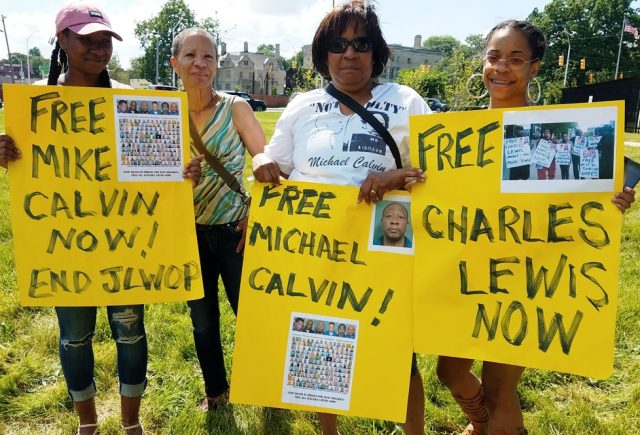
Family and friends of Charles Lewis and Michael Calvin, both recommended for LWOP by Wayne Co. Pros. Kym Worthy, at Juvenile Lifer For Justice Rally last June.
Cites states’ rights to “develop their own procedures to enforce new rule”
Dissenting opinion says USSC requires ALL judges to make statement of facts regarding JLWOP sentence, including finding re: incorrigibility
Michigan one of three rogue states with two-thirds of nation’s juvenile lifers, most of them Black and Latin
PA. State Sen. Sharif Street rallies to pass bill ending all life without parole
Lee Boyd Malvo, 17 when D.C. sniper killings carried out, granted juvenile lifer re-sentencing by 4th Circuit Court
By Diane Bukowski
June 22, 2018

Kenya Ali Hyatt
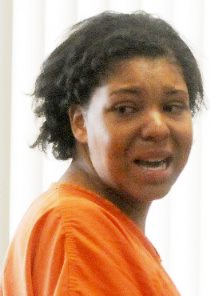
Tia Marie Skinner
DETROIT – With its June 2o ruling on the Skinner/Hyatt cases, the Michigan Supreme Court basically torpedoed the hopes of the Michigan 247. They are the two-thirds of state juvenile lifers who are still incarcerated because county prosecutors recommended renewed life without parole for them, despite U.S. Supreme Court dictates in Miller/Hobbs v. Alabama (2012) and Montgomery v. Louisiana (2016). Many have spent decades behind bars.
In a 4-2 ruling on the combined cases of Kenya Ali Hyatt and Tia Marie Skinner, the court essentially sided with the prosecutors responsible for the continued confinement of the 247. It ruled a judge, not a jury, must preside over re-sentencings, but that the judge does not have to find that the defendant is a “truly rare” and incorrigible juvenile, with less culpability than an adult, as defined in Miller and Montgomery.
Juvenile lifer and long-time jail-house lawyer Charles Lewis said these cases must be further appealed in order to blunt the ruling’s effect on the Michigan 247. Neither attorneys for the defendants nor the Michigan ACLU answered VOD’s calls for comment.
Tia Marie Skinner, 17, of Port Huron, Michigan, enlisted two adult male friends to kill her adoptive parents, both of whom were white, as were her friends. They succeeded in killing her father and wounding her mother. Skinner was convicted of first-degree premeditated murder and sentenced to mandatory life without parole. She was re-sentenced to LWOP at a Miller hearing, but her defense attorneys appealed, saying the ruling should be made by a jury “beyond a reasonable doubt,” according to the Sixth Amendment of the U.S. Constitution.

Justice Bridget McCormack, dissent

Chief Justice Stephen Markman, majority
In its June 20 majority ruling written by Chief Justice Stephen Markman, the MSC found that a judge should make the decision.
But the greatest part of the majority ruling was devoted to the Eighth Amendment issue of “cruel and unusual punishment” in the case of Kenya Ali Hyatt,17, regarding the standard of review in such cases. Hyatt, 17, was convicted of first-degree felony murder for participating with two adult co-defendants in the robbery and fatal shooting of a security guard in Flint, Michigan.
The state Supreme Court reviewed the majority ruling of an appellate conflict panel that was convened to decide discrepancies between trial court rulings in Hyatt and two other cases including Skinner.
The four judge majority on that panel said, “As evidenced by the existence of this special conflict panel, we recognize that this is a difficult issue. Also not lost on this panel is the understanding that juveniles who commit a heinous offense, while undoubtedly deserving of punishment, are categorically less culpable than their adult counterparts and are less deserving of the maximum punishment available under the law. As the United States Supreme Court has made unmistakably clear, it is only the truly rare juvenile who will be deserving of the harshest penalty available under the laws of this state, and a life-without-parole sentence is an unconstitutional penalty for all juveniles but for those whose crimes reflect irreparable corruption. Thus, while we conclude that a judge, not a jury, is to make this determination, the sentencing judge must honor the mandate that was made abundantly clear in Miller v Alabama. . .”
However, Chief Justice Markman of the Michigan Supreme Court wrote for the majority, “The Eighth Amendment, under either Miller or Montgomery, does not require additional fact-finding before a life-without-parole sentence can be imposed.
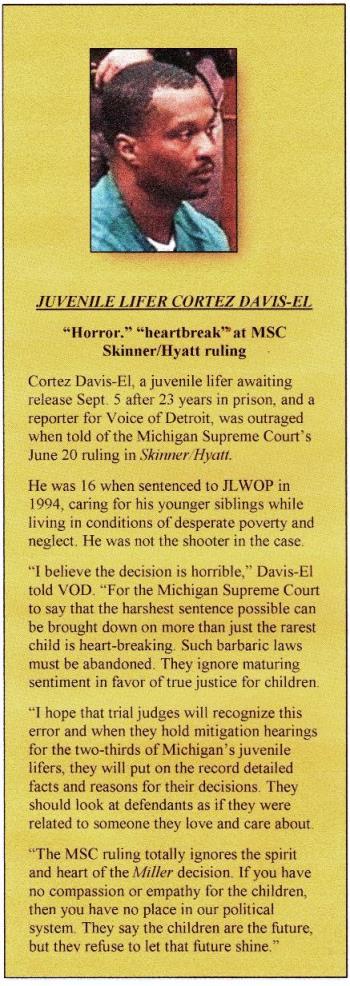 “Although there was language in those cases that could be read to suggest that the sentencer must find that the juvenile offender’s crime reflects irreparable corruption before a life-without-parole sentence could be imposed, Miller simply held that mandatory life-without-parole sentences for juveniles violate the Eighth Amendment and that before such a sentence could be imposed on a juvenile, the sentencer must consider the mitigating qualities of youth, and Montgomery expressly stated that Miller did not require trial courts to make a finding of fact regarding a child’s incorrigibility.”
“Although there was language in those cases that could be read to suggest that the sentencer must find that the juvenile offender’s crime reflects irreparable corruption before a life-without-parole sentence could be imposed, Miller simply held that mandatory life-without-parole sentences for juveniles violate the Eighth Amendment and that before such a sentence could be imposed on a juvenile, the sentencer must consider the mitigating qualities of youth, and Montgomery expressly stated that Miller did not require trial courts to make a finding of fact regarding a child’s incorrigibility.”
Markman said the rulings allowed the states to develop their own procedures to comply with them.
See full ruling at http://voiceofdetroit.net/wp-content/uploads/MSC-Skinner-Hyatt-decision.compressed-1.pdf
The Court thus deliberately ignored the increasing trend across the states to outlaw juvenile life without parole, period, and further branded Michigan as a rogue state, particularly in its treatment of children of color. Two-thirds of Michigan juvenile lifers are Black or Latin.
“Twenty states and the District of Columbia do not have any prisoners serving life without parole for crimes committed as juveniles, either due to laws prohibiting the sentence or because there are no individuals serving the sentence at this time,” says the Campaign for Fair Sentencing of Youth. “Thus, while 30 states allow the sentence, just three – Pennsylvania, Michigan, and Louisiana – account for about two-thirds of JLWOP sentences.”
The U.S. is the ONLY country in the world that allows this barbaric sentence at all. It is virtually the only country with actual life without parole sentences period.
Pennsylvania State Senator Sharif Street has just introduced a bill in that state’s legislature that would abolish ALL life without parole there, allowing parole board hearings at least after 15 years. (See story below.)
“Not all victims of crime want people to die behind bars,” Street said in March. “Many times the people who are victims of crime, they have another loved one who is also serving behind bars. Sometimes people themselves are both perpetrators and victims of crime.”
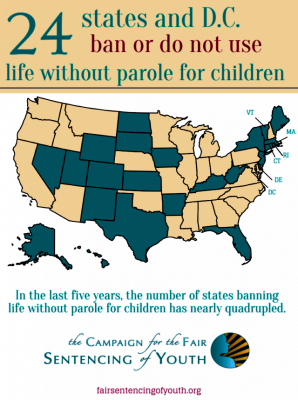 In addition to Michigan’s rogue status on JLWOP, it is also notorious for decades of state takeovers of its majority-Black cities, including Detroit, the largest majority Black city in the U.S. The takeovers have meant the theft of public assets from citizens, and left extreme poverty and unemployment among people of color in their wake, creating a constant pipeline to the state’s prisons.
In addition to Michigan’s rogue status on JLWOP, it is also notorious for decades of state takeovers of its majority-Black cities, including Detroit, the largest majority Black city in the U.S. The takeovers have meant the theft of public assets from citizens, and left extreme poverty and unemployment among people of color in their wake, creating a constant pipeline to the state’s prisons.
Justices Bridget McCormack and Richard Bernstein dissented, saying that both the U.S. Supreme Court and Michigan statutes MCL 769.25 and MCL 769.25a mandate much more than just a jury verdict to impose life without parole on a child.
“In short, MCL 769.25(9) authorizes a maximum term-of-years sentence for juveniles convicted of the enumerated offenses based solely on the jury’s verdict. The remainder of the statute requires motion + hearing + consideration of the Miller factors +a statement of aggravated and mitigating circumstances considered by the court and reasons supporting its sentence before a trial court can impose LWOP on a juvenile,” McCormack wrote. “For these reasons, the most reasonable reading of MCL 769.25, is reading it as murder-plus.”
Notably, neither side acknowledged that both U.S. District Court Judge Mark Goldsmith and the Sixth Circuit Court have struck the portions of each statute that forbid “good time” credits to be included when calculating new term of years sentences for juvenile lifers. Under Michigan law, even those sentenced to LWOP accumulate such credits.
Hopefully, it is not the stance of the Michigan Supreme Court majority that NONE of the Michigan 247 would be allowed term of years re-sentencings.
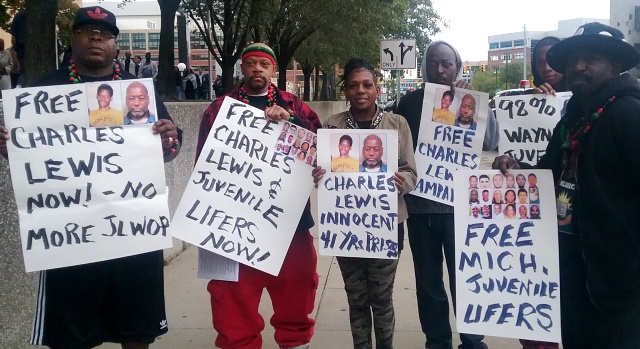
Friends of Charles Lewis demonstrate outside the Frank Murphy Hall in Detroit before his hearing Oct. 11, 2016.
PA. LAWMAKER AIMS TO END LIFE WITHOUT PAROLE SENTENCES
By Ray Downs | March 26, 2018 at 11:38 PM
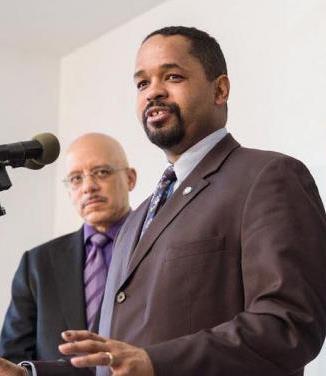
Pennsylvania State Sen. Sharif Street
March 26 (UPI) — A Pennsylvania lawmaker is leading an effort to end life without parole sentences, which would make his the first state to do away with the permanent punishment.
State Sen. Sharif Street, a Democrat out of Philadelphia, introduced Senate Bill 942 back in October and is preparing for a rally to promote it in Harrisburg, the state’s capital, on Tuesday. The bill would allow people sentenced to life in prison to be eligible for parole after 15 years. Street says it’s a bill that makes sense punitively and fiscally.
“There are also fiscal conservatives who support this because they believe that the purpose of our criminal justice system is to keep people safe, to rehabilitate people, and that to incarcerate people beyond that point is an expensive luxury that we can no longer afford,” Street said, according to WHYY radio.
At the Mosaic Community Church in Philadelphia on Monday, Street told constituents that the bill doesn’t guarantee parole to anybody given a life sentence, but extends the process of parole board hearings to people who have spent at least 15 years in prison. It also keeps intact the opportunity for victims of crime to speak at parole board hearings, which Street points out is not necessarily a plea to keep the perpetrator in prison.
“Not all victims of crime want people to die behind bars,” Street said. “Many times the people who are victims of crime, they have another loved one who is also serving behind bars. Sometimes people themselves are both perpetrators and victims of crime.”
Not all life without parole sentences are for murder or sex crimes.
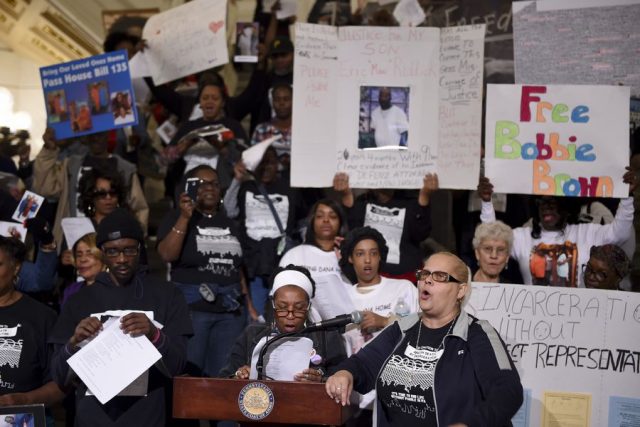
Rally to end life without parole,, held in Harrisburg, PA March, 2018
Looking at data in nine states and the federal prison system from 2012, the ACLU found 2,578 people serving life without parole for drug crimes, 652 for property crimes and 48 for other nonviolent offenses.
Street’s effort to end life without parole sentences comes on the heels of the Supreme Court‘s 2012 decision that said life without parole sentences for juveniles are unconstitutional. Since that ruling, 20 states, including Pennsylvania, have banned the sentence for juveniles.
Alaska is the only state in the country that does not have an official life without parole sentence on the books, but it does impose a 99-year sentence and judges can impose multiple 99-year sentences.
RELATED STORIES:

Charles K.K. Lewis, 59
(The story below on innocent juvenile lifer Charles Lewis has links to many JLWOP cases. Lewis had another in a series of dozens of hearings over the last two-and-a-half years on June 19; story upcoming. He has filed motions to dismiss case for actual innocence, inadequate assistance of counsel, and prosecutor’s move to re-sentence him to LWOP. His entire official court file has been lost, and his Register of Actions wiped out; MSC ruling in People v. Fullman, 1974 says file CANNOT be re-created, despite court’s order to do so, but must be dismissed.)
APPEALS COURT STRIKES DOWN 4 LIFE SENTENCES VS. ‘D.C. SNIPER’ LEE BOYD MALVO
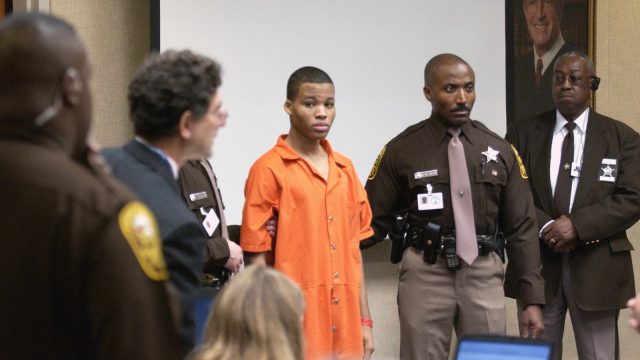
Lee Malvo was 17 was he was convicted of the D.C. Sniper killings, accompanying adult John Allen Muhammad.
VOD: In contrast to the intransigent stance of the Michigan Supreme Court in the Hyatt/Skinner ruling, the Fourth Circuit Court of Appeals has granted juvenile lifer re-sentencings to Lee Boyd Malvo, who was 17 when he participated with adult co-defendant John Allen Muhammad in the D.C. Sniper killings.
THE DAILY CALLER 4:26 PM 06/22/2018
Anders Hagstrom | Justice Reporter
District of Columbia sniper Lee Boyd Malvo had four life sentences deemed unconstitutional Thursday, in line with a 2012 Supreme Court ruling that mandatory minimum life sentences cannot apply to minors.
See full ruling at http://voiceofdetroit.net/wp-content/uploads/Lee-Boyd-Malvo-Fourth-Circuit-Court-opinion.pdf
Malvo, now 33, pleaded guilty to murdering six people in the Washington, D.C., area in 2002 when he was 17 and received four life sentences under a mandatory minimum law in Virginia. A federal appeals court threw out his sentences, his convictions remain and he will be re-sentenced, The Washington Post reported. The ruling also doesn’t affect the six life sentences he received in Maryland. His accomplice, John Allen Muhammad, was executed in 2009.

Lee Malvo, from Jamaica, had been homeless before John Allen Muhammad took him in.
“[The shootings] were the most heinous, random acts of premeditated violence conceivable, destroying lives and families and terrorizing the entire Washington, D.C., metropolitan area for over six weeks, instilling mortal fear daily in the citizens of that community,” Virginia circuit court judges stated. But, “Malvo was 17 years old when he committed the murders, and he now has the retroactive benefit of new constitutional rules that treat juveniles differently for sentencing.”
Malvo’s attorneys will now relitigate his sentencing, claiming that a jury would have granted a more lenient sentence had the option been available. (RELATED: DC Sniper Gets Life Sentence Overturned)
“We’re pleased with the decision, of course, and not just for Lee Malvo, but for all juveniles that are in a similar situation,” one of his attorneys, Craig Stover Cooley, told WaPo. “I think at the time we would have had a sentence of less than life without parole.”
Malvo and Muhammad threw D.C. into a terror during their 6-week murder spree, shooting six people indiscriminately while they were getting gas, going for runs, or other everyday actions.





In all fairness, they should start releasing these poor kids.
After all, every one of them at the time of their “alleged” crimes
was a victim of circumstances beyond their control.
Each and every one of them just so happened to be in the wrong place, at the wrong time, with the wrong people, doing the wrong thing.
I mean, come on, tell the truth. There but for the grace of God could have been any one of us!